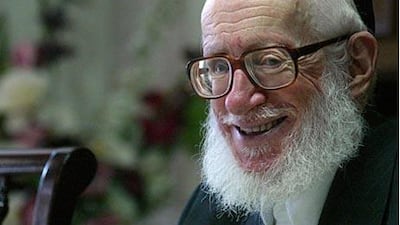Rabbi Moshe Hirsch, who has died aged 86, was the leader of an ultra-Orthodox Jewish sect that opposed the existence of the Israeli state, and a long-time adviser to Yasser Arafat. Related through marriage to Rabbi Aharon Katzenelbogen, founder of the anti-Zionist sect Neturei Karta, an extreme group that is hostile not only towards the state of Israel but also towards any ultra-Orthodox communities that benefit from the state's budget, Hirsch subscribed wholeheartedly to the group's conviction that "the true Jews are against dispossessing the Arabs of their land and homes".
He became a confidant of Arafat in the 1980s while the PLO leader was in exile in Tunis. Following a spate of Palestinian attacks that claimed victims in the Orthodox community, the sect appealed to Arafat to spare a neighbourhood that had openly dissociated itself from the Zionist project. Arafat promised to do so and the friendship was sealed. Appointed "adviser on Jewish affairs" on Arafat's return to Jericho in 1994 and the establishment of the Palestinian Authority, Hirsch was considered extreme even by the anti-Zionist Eda Haredit and Satmar sects, which routinely denounced him. Responsible for "external affairs" at Neturei Karta, he saw support for the movement wane during the past decades, while the majority of Israelis viewed his decision to befriend Arafat as the ultimate betrayal of his religious beliefs.
The more extreme elements of Neturei Karta reached out to those perceived by Jews as bitter enemies, including Iranian fundamentalists, to share their own opposition to Zionism. In 2006, the sect's leaders travelled to Tehran and posed for photographs with Mahmoud Ahmadinejad. Whether Hirsch was in their number was unconfirmed. Inevitably, he suffered for his loyalty to Arafat. Habitually dressed in the traditional black garb and wide-brimmed hat, Hirsch had one good blue eye, and one glass blue eye. While in his 60s, leaving morning prayers, he was victim to an attacker wielding acid. The man was never identified or prosecuted, but the rabbi continued attending synagogue regardless. He became used to irate Israelis spitting in his path whenever he ventured outside the Mea Shearim district of Jerusalem where he lived.
Born in New York in 1923, he received his rabbinical training at a yeshiva in New Jersey before migrating to Israel, a place he always referred to as "occupied Palestinian territory". Though he settled in Jerusalem and died there on May 2, Hirsch never became an Israeli citizen. He is survived by his three children. * The National

